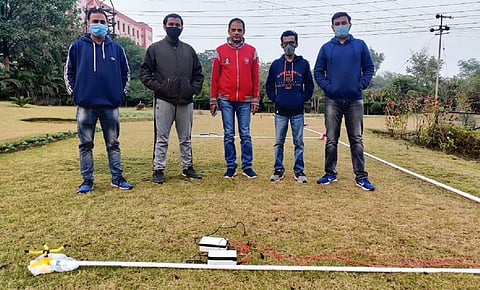

RANCHI: A team of professors and students from IIT (ISM) have developed a new Smart Auto-Irrigation and Soil Monitoring System which is primarily focused on motivating and engaging underprivileged families of farmers affected by COVID19 to take up agriculture, powered by the promising new system as a permanent source of income in their native places.
Under this system, moisture of the soil along with surrounding temperature and humidity could be monitored regularly through the sensors fitted with a master device in the farms which is connected with mobile application prompting the motor or sprinkler to start automatically in case any of the parameters goes lower than the prescribed limit. The project was started in July last year and got
finished recently.
This project is a part of the IEEE HAC (Humanitarian Activities Committee) and IEEE SIGHT’s (Special Interest Group on Humanitarian Technology) in response to the current COVID situation in which one institute from selected developing countries has been selected to improve the COVID-19 situation in their society by the means of technology. The project was granted a research fund of USD 3,700 to kick start the initiative of IIT (ISM) Dhanbad for empowering the people of Dhanbad.
Meanwhile, additional grant of 4995 USD has also been provided by IEEE for scaling up the project under which the system which operates on electric power will be made solar powered besides adding some extra features in it. As the research work is still on, it is yet to be commercialized, for which more funds will be required.
According to the team leader, since maintenance cost is very low, this system is cost-effective and can be easily borne by the farmers. “It is an automatic system under which, a signal will be received on the android phone through a mobile application – AgroPro, when moisture content of the soil goes down from a certain level and the motor or sprinkler gets started on its own, without any human intervention,” said the team leader Professor Rajeev Kumar Ranjan.
It will be helpful for the migrants who have returned back to their homes due to the lockdown and want to do farming in their native village but they have limited irrigation facilities and manpower, he added.
“We are also trying to include pF sensors in the system which could help farmers to decide which crop would be more suitable for that particular field,” said the team leader. Though, it is at research level the prototypes have successfully been installed at various locations -- Koyla Nagar Eco-park, Rajendra
Sarovar Park, Krishi Vigyan Kendra, and Sardar Patel Nagar in Dhanbad, he added.
The professor further said that they aim at developing the project further into an effective food security system using Artificial Intelligence that can predict various crop-failure scenarios before it is too late. The research is also on for developing a unified database system that can predict the crop that should be grown for better yield in the concerned area, he said.
"Solar panels can be used for supplying electricity to the system, thus making it more sustainable," Ranjan said. The proposed research ideas can be implemented with proper financial and administrative support from government organizations also, he added.
Another team member, a second year student of department of Mathematics and computing with IIT (ISM), said that Smart Auto-Irrigation and Soil Monitoring System has three sensors – soil moisture sensor, DHT sensor which senses surrounding temperature and humidity, while the third sensor senses temperature of the soil.
“Lead role, however, is played by the moisture sensor which senses the moisture of the soil placed at different locations and sends it to the master device on the basis of which, master device switches on the motor or sprinkler as per the requirement of the soil. Once the area gets irrigated and the moisture level goes up to a certain level, the motor is switched off automatically,” said Roy.
All the communications between the master device and the slave devices could be seen on mobile phones by downloading the mobile application AgroPro, and getting connected to it through Wi-Fi, he added.
The system has been designed to overcome the unnecessary water flow into the agricultural lands using a sprinkler system. The sensors in the master device and slaves keeps on sending wireless signals round the clock through ICs fitted to them, he added.
Other team members are Dr Dhiraj Kumar, Pushkar Srivastava, Ankur Chourasia, Virmani
Harshvardhan Solanki, Kapil Verma, Om Kumar, and Rahul Gupta.